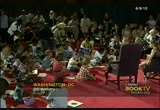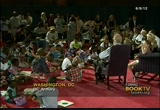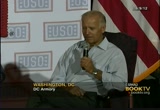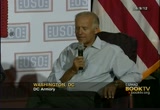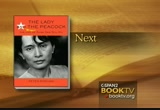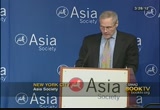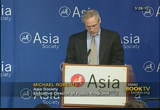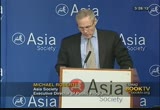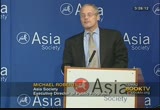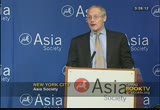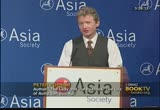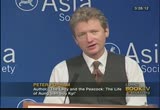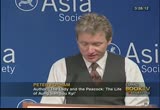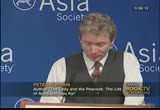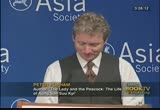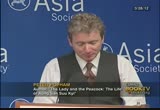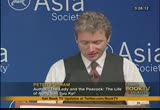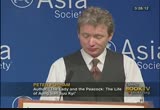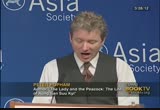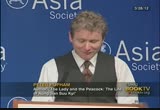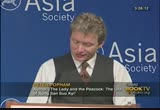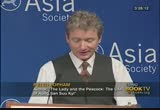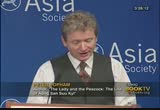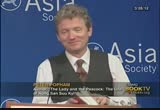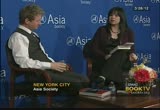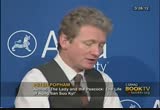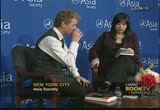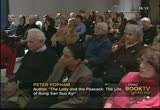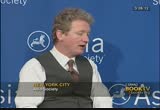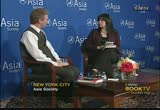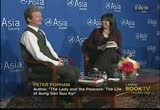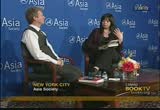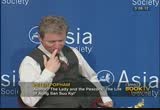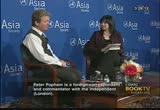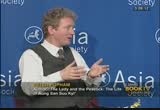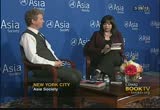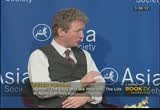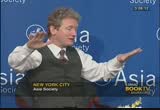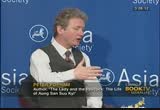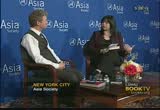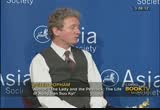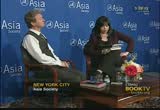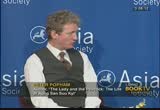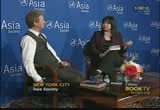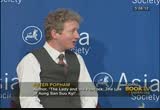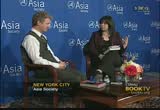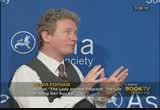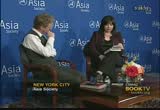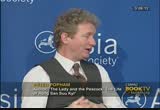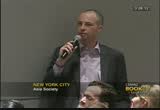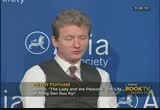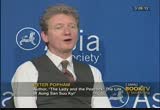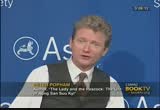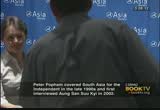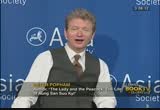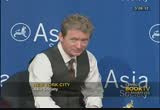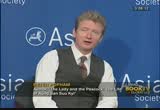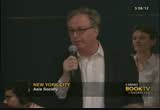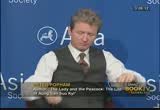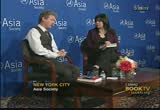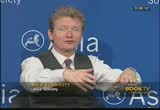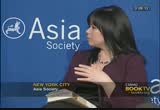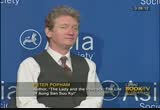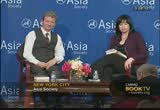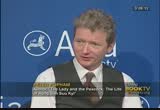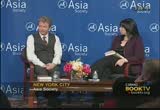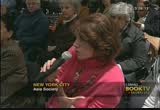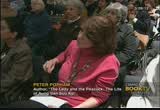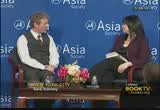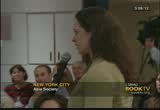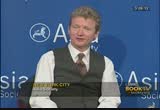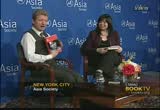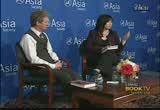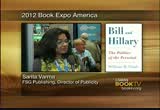tv Book TV CSPAN July 1, 2012 7:45am-9:00am EDT
7:45 am
>> your champ is upside down? champ, when he put the collar on, he put it on upside down. i bet your mommy and daddy can get it undone for you and do it the right way. can we find a champ collar that is right side up? there's one right there. you got champ right side up now. yes? if you want to say something? -- did you want to say something? [inaudible] >> well, i think i started something. they said and we get a dog like this? that will be up to your parents but i can't really do that. do you know what i had to do to get that dog? i want to tell you a real true story. i always had dogs when i was a little guy. then when i got to be a big eyed
7:46 am
i always had dogs but it's nice to be a united states senator. i used to work in the capital, and i commuted everyday. i got in a train and i would 125 miles to washington and i would go home. and one day i came home and i said big dogs. and my doggies were gone, and mrs. biden said look, a dog misses you so much, you are never home. and she joked, she said i'll tell you what, you can get another big dog if and when you get elected president or vice president. [laughter] you think i'm kidding. i'm not kidding. true story. and i said why is that? she said at least you would be home been. and she said it would be different. so when i was running for vice president, every once in a while things get kind of like all men is as tough or something, and i get in the airplane, and mrs. biden, literally, would take on the bulkhead of the chair of the seat in front of me and airplane a picture of a german shepherd.
7:47 am
and so guess what? at christmastime after i got elected vice president, we have a family dinner christmas eve, and my granddaughter, my number three granddaughter came up and said pop, we have a prize for yo and in they brought champ, my dog. so i had to get elected vice president to get a dog. [applause] so i don't know what your mom is going to make you do. [laughter] to get a dog. [inaudible] >> you have one? what kind of dog do you have? >> i have to. [inaudible] a miniature schnauzer. >> okay. yes, tiny? did you want to tell me something, or mrs. biden something? >> i had a dog. he ran away. >> oh, that's a shame. that sometimes happens.
7:48 am
sometimes happens to doggies. well, you are also good, and know what? i think they have some food back there for you all. and so, general, i'm going to turn this back to jail, and i thank you very, very much for your hospitality. folks, thank you so much. all those who served, god love you. we are proud of you. we really, really, really proud of you. [applause] you are the best america has ever produced. thank you. >> we'd like to hear from you. tweet us or feedback, twitter.com/booktv. >> up next on booktv, peter popham talks about his biography of burma's aung san suu, the longtime opposition leader and nobel peace prize recipient was elected to the lower house of
7:49 am
the burmese parliament on april 1, 2012. in researching the book, he took over trips to permit and interviewed aung san suu. >> welcome. i am michael roberts, executive director of public programs here at asia society. and i want to welcome you all. it's a great pleasure to present an important and authoritative new biography of one of the most compelling figures of the last 25 years. it's the current embryonic transition in me and morris succeeds in bringing the country back from its quarter-century of oppression and stagnation, its pariah status. a great deal of the credit will be going to aung san suu kyi but in 1980, as i'm sure you all know, she was propelled from the obscurity of an english epidemic like to become leader of our
7:50 am
most democracy movement. following her party 1990 electoral victory and the subsequent military crackdown, she spent most of the next two decades under house arrest, like mahatma ghandi and nelson mandela before her, her oppressors only succeeded in making it an even more potent and important symbol of her country. and now that she's happily come out of confinement and will compete in the upcoming elections, the whole world is watching to see what the next chapter of this extraordinary story will be. this excellent book, "the lady and the peacock: the life of aung san suu kyi" will remain an indispensable part of that story. it will be on sale afterwards in back of the hall. and i hope you all buy it and the author, peter popham, will be happy to site. we're happy to have him with us tonight. he writes frequent for the british ms. bair, the
7:51 am
independent, and has reported from albania, mongolia, south asia and now italy. is also the author of tokyo, the city at the end of the world. i'm happy to say that asia society has been able to make an important contribution which continue to informing the policy dialogue immunoassays and asia, and to helping directly through tractor and other initiatives to bring about a democratic transition in myanmar. we are delighted have the architect of those efforts, suzanne dimaggio, to conduct our conversation with peter. suzanne is co-author with the asia society report and advancing myanmar's transition, a way forward for u.s. policy which i think you will find copies of on your chair. i urge you all to read it. it's a really excellent and important peoplepiece of work.
7:52 am
this summer they will release a new report, led by our senior asia society advisor, who has access the current state of pakistan's police forces. and in a report that is co-author of by other pakistani and u.s. experts, they will present recommendations for enhancing institutional capacity within pakistani police forces. also, please come back on april 12 for another exceptional program on the same subject, which is called the u.s.-pakistan and afghanistan, untangling without unraveling. this is part of our hbo sponsored series on asian hotspots, and it will feature doctor volley nostra, the newly named dean yesterday, the johns hopkins school of advanced international studies but any form an adviser to richard holbrooke.
7:53 am
he will be speaking with others. please check out asia society's website for additional information on this and other programs. there are also flies in back are just a couple more housekeeping announcements. if you are not members of asia society already, i hope you'll consider joining. we present a great many wonderful programs here and performances and work in all the disciplines and media in which asia society works. and its tremendous value for very small amount of money. we hope you'll consider joining i want to remind you that we have live webcasting tonight's program, and am also very happy to say that it is being recorded for c. span, for later we broadcast. so when we come to the question and answer please be sure to wait for the microphone to an we may have questions from our online viewers. and if we do, any of you
7:54 am
watching, feel free to write into the moderator at asiasociety.org. and, of course, turn off your cell phones if you have them. and welcome, please, peter popham and suzanne dimaggio. [applause] >> peter will read first and then suzanne will join him for discussion. >> thanks very much. good evening. good to see sony people here today. i've been thinking about burma, visiting burma for more than 20 years, and have been writing this book far, i was in the process of researching and writing it for five or six years before it was actually finished. but certainly burma has never
7:55 am
been so interesting and important as it is at this particular moment, so i feel very fortunate to have found an american publisher with the energy and gumption to get it out exactly the right moment. and to the asia society for having the kindness and to welcome me to talk about it. i thought i would read a few pages from my book about the election of 1990. because we are on the cusp, as you know, of a by election on sunday the first of april. it is only the third uch election since 1990, multiparty election. 1998 election and 2010, and then this ie election which we followed by another general election in 2015. so i thought it would be worth while looking back, 22 years, to
7:56 am
aung san suu's first appearance, not on the ballot paper because she was barred from standing in the first appearance of her party and what transpired. on sunday, may 27, 1990, aung san suu kyi still under detention in her home casts her vote in her countries first free general elections of 30 years. the ballot paper was put into an envelope which was sealed and taken from her home by a regime official. to most foreign observers it look like a futile gesture. for, the international media have been scrutinizing burma's upcoming poll, concluding that it was bound to be rigged. the military had done everything in their power to ensure a good
7:57 am
result. a win for the national unity party, the proxy party as the burma socialist program party had been hurriedly rebranded. the top leadership of aung san suu's party had been put out of action with aung san suu kyi under house arrest since jul july 20, 1989 i should say. that retired general who was chairman of the party and have been detained detained the same day was sentenced to three years hard labor in december, and taken to insein jail. most of their closest colleagues had been jailed and would not reemerge four years. the party was now run by a skeleton staff of those who remained at liberty, led by the
7:58 am
tough the wisecracking former colonel who had been one of the first people to join suu two summers before. in january, the regime sought to neutralize the threat posed by suu's personal popularity by barring her from standing as a candidate, because of her marriage to a foreigner. a new rule. her image was everywhere in the nld's campaign, on banners, t-shirts, posters, patches and scars. cassette tapes of her campaign speeches were sold from market stores. but the lady herself was formally locked away. -- firmly locked away. the general, head of military intelligence and the second most powerful man in the agenda, into long speeches drove home the message that's -- that suu's party was a menace for the
7:59 am
future. on august 5 he repeated the now the mayor claimed that the nld have been infiltrated by communists. the following month at a press conference where he spoke for seven hours, he made a diametrically opposite allegation that suu under party were at the heart of an international's righteous conspiracy involving powerful foreign countries. the speech was later published, a 300 page book, with a catchy title, the conspiracy of treasonous minions and craigslist go horse. emasculate the nld, however, was only part of the task of manufacturing a good result. the state law and order restoration council now set about tackling the remaining challenges with military thrown us. other enemies of army rule will put under house arrest, including former prime minister.
8:00 am
the regime identified city neighborhoods with high proportion of opposition supporters, and broke them up. in the months leading up to the election, at least half the many people around the country were forced to abandon their homes and move to crudely constructed and malaria ridden new townships far away. ..
8:01 am
>> to make sure that the heavens were on their side, they picked a good day. may 27, contained a plethora of lucky nines. it was the fourth week of the six month. an offer from the u.s. to send election monitors were in turn was rebuffed. all corners were banned from the election. on the eve of polling, the general would be wells pleased with the handiwork. there was a decision to to monetize their currency and throw a constitutional arrangement by the idea of multiparty elections. but since the looking up of that
8:02 am
woman, should he refuse to pronounce her name come the situation had improved all around. the socialist ideology which had conditioned everyone for a generation, was consigned. burma reopened for business print some countries may have found it awkward feeling on him and turn normal to with a country that had watered thousands of its unarmed citizens in cold blood. thailand, singapore, south korea had so no inhibitions. a south korean company, yukon, became the first foreign company allowed to explore foreign oil onshore. followed by shell and petro canada and the american firms
8:03 am
amoco and [inaudible name]. when the army board and to down downtown rangoon, the firms have been less than $10 million. now they were between 200 and $300 million. top security prevented any significant demonstrations to mark the anniversary of the great uprising of 8-8-88 or a military crackdown. a softening approach, they signed a deal to bottle soft drinks and burma. to demonstrate to the general public and the world at large that they knew a good thing about good governance, a major cleanup campaign was launched. reminiscent to the operation in 1958 under the caretaker government. rangoon's public buildings cleaned with fresh paint.
8:04 am
the governments of western europe and the u.s. remain dubious and willing toforget how these people had come to power. but this election produced a solid working majority in the vote sure between such a plethora of parties that the army would be fully justified in retaining control, which surely would bring them around. so confident were the generals that they began to relax a little bit. they admitted a handful of foreign journalists and foreign news crews to watch the burman phone. martial law restrictions were partially lifted. the soldiers were temporarily replaced. army and uniformed police disappeared from the streets. it was the usual fermis
8:05 am
vanishing trick. i have seen on the day of suu's mothers funeral. a zero-sum attitude power, where they there are either overwhelmingly present are totally absent. even if they are absent from everyone knows that they are not far away. the nld took to the streets, employing the people the road to be sure to give them their vote. in the income of the people needed no imploring. the lines began forming outside schools and government offices were voting was to take place early on the morning of may 27. the army, again, was conspicuous by its absence. the voti was overseen by civilians. since permits conversion to civilian rule had happen by magic overnight. people put on their sunday best
8:06 am
to perform this important and extremely rare civic duty. as in india, every registered party was analyzed by nikon depicted on the voting slip. these included a beach ball, a comb, tennis racket, and a novella. powerful and evocative symbols such as the peacock, which is now the nld tumble in the present election, or banned. the nld had candidly chosen the farmer's straw hat to symbolize their party making it easy for that supporter to indicate their preference while hearing in the normal russet costume. nationwide more than 20 million people were eligible to vote. in seven constituencies where the army was fighting insurgents, pulling was canceled altogether. in many other border areas from only a fraction of registered
8:07 am
voters manage to go because of the violence. in and most of the country, turnout was heavy. some 72% casting votes in total. late on the night of polling, the chinese news service was the first foreign news agency to report the first result of burma's first election for 30 years. the nld candidate, a woman, and over half the votes cast. that result was followed by a flood more, and to the shock and horror of the military, the overwhelming majority of results went the same way. voters did not care for the evergreen young men's association, the national peace and comfort party, the women's league for democracy and peace, nor for the army saver, nor for
8:08 am
the nup. aung san suu kyi was sweeping the board. [applause] >> thank you everyone, thank you peter for joining us today. i have many questions and i am going to be mindful of the time because i know you do, too. and i want to make sure that we get as many in as possible. let's begin with the obvious, what everyone wants to hear about, which is leading aung san suu kyi. he did so twice, which is in 2002. she had just been released from house arrest, and most recently, you've met her march 2011. that is a decades spanning between. was there anything that struck you in that time. not that changed about her? secondly, described the meetings
8:09 am
in general, how did she feel about the book? >> she was not remotely interested. to my surprise and disappointment, she didn't want to help. i got a copy of the book to her when it was published by the british embassy. she wre a very gracious e-mail thanking me for my efforts. but i think it is part of her remarkably un- egotistical character that she doesn't care that people write books about her and she doesn't want to read them, and she certainly doesn't want to endorse them. that was the message that i took away, unfortunately. >> any difference between then and now? >> no. 2002 was a bit like last august when things started to shift rapidly. it seems that things were really
8:10 am
on the move in 2002. she was released, and then there was this dynamic time, a gentleman who was facilitating negotiations. a gentleman that had some imagination. he brought the nld into dialogue with her in particular. i ran around talking to a lot of people, some very close to the regime and some close to her in the party. the impression that i took away was that they were going to do a deal. a deal within the offering, and she in the party would come back into the constitutional process. the whole thing would start again. the thing was derailed in the mid- 1990s, and then it started again. >> let's talk about diaries that
8:11 am
provided a key source for the biography that you wrote. the author was one of aung san suu kyi's closest friends in confidence, who reportedly was turned by military intelligence, and many now see her as a traitor to the nld. tell us how you obtained the diary to the extent you can tell us, and do you have -- when you met her, how did she react to the fact it had the diaries and you were using them as a source in writing this book? >> she was quite relaxed about it. i met her through the wife of one of my best friends, who happens to be a school friend. i had a privileged introduction to her. and it was a person in london who gave me the diaries i cannot reveal the persons name, but when i told her she got these
8:12 am
books, he was pleased. her story is that she's a fluent english speaker. the wife of a divorced diplomat. and she was brought up in international schools in a very good writer. and she became suu's close companion during the first campaign tours in 1989 -- in 1988 and 1989. she often slept in the same room in the same cabin in the same vote. being with her all the time, taking care of her needs and so on. the request of michael, her husband, she was writing a daily diary of what happened, but i found this, it was actually wonderful. part of the problem of writing about suu is that we know that there are facts about her life. but there is not a great deal of
8:13 am
human detail. the author provided with detailed. interesting insights and charm. you know, it was -- go find the sun and reading the book -- it puts in a completely new and very charming wife, in fact. it brings up human dimension of suu. in july 1989, when suu was put on house arrest, all of the other people close to her in the process -- all her closest colleagues were taken to insein prison in e middle of northern rangoon and put in jail. and she didn't get out for three years. she told me that while she was there she had all night interrogations. i was informed by two sources who i think are very trustworthy that she was prevailed on to
8:14 am
basically change sides. since 1995 when she came out of house arrest, she became a very formidable critic of suu and a critic of sanctions and never missed an opportunity to talk to the likes of me. especially in 2002, and one person who wrote a piece about her in the new yorker in which he said over again -- the suu is stubborn and driving them into policy and she must be stopped. would have been a beautiful friendip turned into a very ugly ending. >> has she read your book? >> she has. i went to great trouble to make sure that she received a copy. i received a very bold and
8:15 am
hostile letter from her. >> i see. one other thing that i want to address is the mystique that surrounds aung san suu kyi. a lot of the previous biographies and biographical accounts of her fall into one of two categories, either seeing her that as this divine being, like almost superhuman, and others that critique her for being, like you said, stubborn and focused on the sanctions, also coming under criticism for abandoning her family and her two young sons and her husband to pursue a career in politics. your book, i think, it really presents the complex picture of the close realities that we have seen. through this journey of writing this book, having access to the diaries and meeting her
8:16 am
yourself, what are the key characteristics about her that you think people just don't know? >> well, i think people are confused by her. the question about stubbornness is irrelevant, in my opinion, it is a fact that she was extremely and totally inexperienced when she first got into politics and made lots of mistakes as an adult. it's also true that she is not a natural politician. she was never involved the politics of any sort. before 1988. i think one can look back on the past 23 years of her life -- the extraordinary life she has led and see that she would not be where she is today without some quite remarkable qualities. the quality which i identified
8:17 am
is that when she -- act like an early age, she knew who she was and she knew what she wanted, and she cultivated the willpower to achieve it. she came to england to study at oxford in 1964, and it was a tenuous. not between arriving in england and getting married. she blossomed in various ways. she took up decisions. she came to study politics and economics at oxford. she did not like it. she tried twice to change objects, once english, and wants to foresee. both times she was refused, and so she ended up getting a very court agreed.
8:18 am
she never showed any sign of being ashamed of it either. she fell in love with the pakistani come in the relationship continued after she graduated and ended in tears. then she fell in love with the man who became her husband. i can see her mom back in rangoon and i can envision her receiving newsletters, reading them with mounting anguish. actually seeing the strange decisions that suu is taking. a beautiful daughter of that family -- she would graduate with a degree and fly back to burma and marry a suitable boy. or something like that.
8:19 am
after graduating, after mucking about, she flew to new york to live with a friend who was an older lady that was a former pop singer in rangoon before the war. and she stayed in new york for nearly three years. she was very much doing what she wanted. her mother -- her parents were not happy about it, but it was her life. quite early on she got her own compass and that is what she has followed since. >> another key point you make in the book is she is so important to burma for so many reasons. one of them is hurt existing, even from the first days of her involvement in the uprising in 1988, her involvement in nonviolence. without her insisting on it, you
8:20 am
think perhaps the burmese revolution may have taken a different course. even up untilnow, we have seen a different course for burma. then we go on and make the point that because of this, she is not only important to burma, but she is important to the world. this value and this point of view, philosophy. nonviolent approach to democracy. let's talk a little bit about that. two i think that she, you know, she lived in india for three or four years in her adolescence when her mother was the burmese ambassador in delhi. and she clearly absorbed a lot from the environment, particularly the writings of gandhi and tagore. it's actually only service in her scholarly world many years later before she went back to burma. as you say, she was very very
8:21 am
clear about nonviolence, which was a core gandhian value right from the outset. and she was quite domestic about it. and it was very important because the students who are at the cutting edge of the uprising, by no means nonviolent. there was a terrible atrocity for the committee in the early part of the uprising. people had their heads cut off, very nasty bloodshed. the role model for many of the students at the time was what was happening on the borders. these insurgencies that were raging. also the burmese army. many of the students saw that is the way to go. she insisted that nobody in her party could use violent means, and she successfully prevailed.
8:22 am
her meetings became famous for the completely good humor and the lack of any disturbances in them. >> another he wrote this book -- you finished it before her reemergence into the political world. and certainly before she announced her candidacy for parliament. as you mentioned, the election will actually take place on sunday. throughout the course of studying her life, did you ever imagine that it would take a turn like this, and with the elections to be held on sunday, how do you see her future unfolding? >> i don't think one broke off the possibility that things would change again. it seemed unlikely, but as i said in 2002, there was an opening.
8:23 am
in 2004, they started negotiations with her. really, we needed to get [inaudible name] out of the picture, because he could not stand her name or anything about her. >> do you think he is really out of the picture? >> i believe so. we were discussing this before, and it's hard to believe that he has believed what is happening now. he tried to assassinate her in 2003. one did not see coming. i think everybody was stunned and amazed and delighted when things started to move in august and september of last year. one can't say it was a shock. it was a delightful surprise. >> now, in terms of her rejoining politics as an opposition leader, it is clear
8:24 am
that she has taken a bit of a calculated risk by joining the very system and people who can find her in the first place. but making a leap of faith by being on the inside, she has a better chance of pushing pushing democratic social reform than working from the outside. do you think that that is the right decision, this decision has led many to criticize her head something she should stay outside of government and remain a staunch critic that she can be. how do you fall in this? >> considering her goal in life is not to be an icon of democracy, i don't think she had any serious alternative and
8:25 am
plunging in. certainly, they're working people in her party who thought was a very poor idea. many people in burma would say the same thing. i think she was confronted by the desperate need to get things actually moving. she saw that this was -- particularly with the president. as opposed to she said she can trust and is a good listener. however flawed, however limited, this is the opportunity to be grabbed, and she was right to do so. >> i want to take a quote from a recent op-ed by thomas fuller. he writes that fight entering politics at this delicate stage, aung san suu kyi is imparting legitimacy on a government run by the same generals that she battled for two decades. the reform falters, aung san suu kyi could be held partly responsible. that seems a little bit harsh. but the weight of the world on
8:26 am
her shoulders like that -- i guess -- the bigger question is in terms of the reform itself, under the you have written recently in "new york times" apiece and you expressed skepticism about the extent of the reform. saying that they are mostly at the state still symbolic. although, of course, welcome. but still needed a gold a little bit further. i wanted your thoughts specifically. what you think needs to happen to make those reforms take deeper root and become irreversible. what would be the key prerequisites before, in your mind, you say this is really something different. >> well, the key thing that needs to happen is constitutional reform.
8:27 am
the election of 2010 and this week is on the basis of the constitution, which gives e military 25% of seats in parliament without any election. and it puts a military council with enormous unspecified powers about parliament unable to declare martial law at any time. suu herself has declared constitutional reform to be perverse policy. one can't see that it is likely to happen because too many powerful people have a vested interest in the constitution. but who knows? crazy things have happene let's hope she knows something that we don't and that is the next stage. >> have there been any reforms that have come more as a surprise to you? early, the political reform, the fact that opposition politics is back on the scene in burma. even economic reform seemed to
8:28 am
be signaling a change with new investment loss. the currency float. i guess the one criticism people have the reforms have not extended into the field of human rights or addressed significantly the ethnic conference. is anything surprising or? we see is the most significant, come and what you see is the biggest challenge? >> i think that human rights are certainly --. the economy is absolutely critical. several that returned from burma the other day said that everything has changed. everyone is out of jail. and say what you like, it's like
8:29 am
a different country. the economy is so dead in the water. there are no new jobs and reforming the economy -- it is an enormous task. that is where lifting sanctions comments end. then we enter late delicate territory. as i'm sure, many people here come as you are, the sanctions are the only leeway that we have on burma, and so in this time, the listing of the sanctions with great care and astuteness -- it is clear that for the burmese to really get behind the reform, they need to see some improvement in their standard of living. and that has not happened yet. >> let's talk a little bit about sanctions, because obviously, in washington, people will be watching the selection very closely. many people have argued that if
8:30 am
the election is conducted in a reasonably open and fair way, and i say reasonably because there probably will be some instances of irregularities in arctic have been. some advocate that once we get over this election and she is in parliament, that this is probably the time to start lifting trade and investment sanctions. what do you think? you think that that goes far enough? you think more prisoners need to be released? or is thisa process that has to unfold gradually? >> these things have come back, the great majority have been released. of prisoners. some are locked away for strange reason still, including members of the entourage who are locked up in 2004. those are the things have been done to a large extent. in a way, these are relatively
8:31 am
easy things to do once you decide to make these gestures. people come out into the street. the hard thing, as i said, is to change the constitution, which the government has shown no interest in doing. it seems to me the most that the most important and significant sanctions should remain in place until there is some indication of movement towards a more genuine and thoroughgoing democratic constitution of burma. >> let's stay on u.s. policy for just a second. some critics have said that u.s. policy is just too dependent on aung san suu kyi and what she says what she thinks. and that the time has come now for the u.s. to reach out to others in the opposition movement and in civil society come to help them form that decision. what is your take on that in
8:32 am
terms of the fact that it does seem that she has extraordinary and rightfully so -- extraordinary influence on how lawmakers in washington decide what and what not to do on burma policy. >> it does seem overwhelming come investment that a single person should hold the fate of the country in her hands, while there are plenty other opposition politicians with plenty of experience. many with great political experience who are around. but i think that in the last nine months, since her release in november of 2010 time she has justified the faith that western leaders have put in her hands. her statements in her moves have been very measured. very prudent. it very carefully calculated. i think that she is proving an extremely useful and effective
8:33 am
interlocking way between her country in the western world. which is the road that it -- the role that he knocked out for her and the role that the west is happy to perform. as long as she retains this enormous support, from the burmese masses, i think that she has a pretty good claim to play that role. >> i still have many questions i want to ke sure that we get the audience involved. even the online viewers if they have any questions, raise your hand. i see a question in the back. just wait for the microphone to come get you. if you don't mind introducing yourself as well. >> hello, i am saun king from part strategy. i have heard the former
8:34 am
singapore ambassador to the u.n. on this very stage say that sanctions against burma were a tragedy of the west. they made us feel better about ourselves but did not result in any change. i think i know your answer, but in light of current events, how do you think those comments stack up to date. >> many people who would like to do business with burma have been chomping at the bit for many years this is one of the last remaining largely on explosive corners of asia. people have been dying to get their -- to get their hands on it for long time. as we saw from the passage in which i read, the oil companies had very little concern for the
8:35 am
human rights and onshore expedition in burma. one simply has to decide whether the human rights situation in the country is significant or not. when you have this appalling human rights situation that we have seen in burma -- does the west have a duty to extend up and -- stand up and try to change that behavior not? is a crucial ad debating question. the fact that we are now where we are, and that the massive burmese -- the burmese can read what newspapers they want -- they can start trading and they can go in and out of the country and with a bit of luck, in a year or two, they will even have some jobs. you know, this is all partially
8:36 am
thing to what west is done. no, i don't think it's a mistake. >> yes, wait for the microphone, please. >> i wanted to get your take on why you think the generals are making the changes this time. it just seems too good to be true. >> it is extraordinary, is not? >> i think that there are various reasons. the most interesting is burma, in the trading relationship with the west, it has found itself on an ever closer embrace of china. which has been -- become too close. china is just over the border. there is an unpleasant burmese proverb that reads that when china sinks, or muslims.
8:37 am
burma, like other southeast asian countries, is prone to feeling in danger, under danger of being colonized and taken over. there is a chinese dam on the river which is a symbol of the country. the chinese were going to build the dam and import electricity back into china, while, of course, burma has an appalling electricity provision. the president showed he had his head screwed on when he announced the suspension of the project last year. i think that is a significant factor in what is happening. >> yes, you in the blue?
8:38 am
>> hello, my name is dave. i'm wonderg what you think in the near future access to the country will be as far as four foreign journalists. it seems like foreign reporters from western organizations have actually been able to go when with the journalist visas for a few weeks. they o to an area for one week and then file their story -- as far as having resident journals would stay there and ierse themselves in the country, do you think the government will allow that soon? >> well, yes, the democratic voice of burma -- was founded and stay there. they are setting up an office in rangoon. certainly, the burmese nationals are able to practice journalism or believe that they will be able to practice free journalism inside the country. for foreigners, the picture remains ha and very hard to pin down.
8:39 am
months ago -- he received no feedback of any sort, which is not typical of burmese embassies. my own correspondence common with the tourist visa. in his filing under a fake name, which is the way we always used to have to fnction. it is happening with regard to foreigners. people are getting wins of politicians. a bunch of foreign journalists, in which they were able to work with. they're trying to decide what they really want to do about this. they exposed this element in this burmese society, which cannot be underestimated. >> yes, across the aisle.
8:40 am
>> i have been to burma twice and i have burmese friends there as well as here. given the pace of these reforms would seem to have done a complete leap of faith, there have been criticisms that the motives o the [inaudible name] and generals are suspect, and also, and i have heard this from burmese friends in new york, the fact that aung san suu kyi was out of sight in a way for all those years, that perhaps are relevant to any change -- one might question the relevance to any change that is going to come or have come this far and i was wondering if you could comment on those aspects. >> i think one has to have great respect for anything but the burmese say about the situation. as opposed to non-burmese
8:41 am
commenting on it. it is true that she was out of the picture for ages and ages. it was a bit like rumpelstiltskin when she emerged, she had never used a cell phone. she has been working hard to catch up. working hard is the one thing she knows how to do. if anyone can say anything clearly, she is going to emerge as a more plausible democratic opposition leader that has not emerged yet. >> any other questions? >> i am bill mcgowan. an author and journalist. i wrote a book about political life in sri lanka. i'm going back to burma after 20 years to oh, really. >> i'm curious, when i go back,
8:42 am
will i find that they are more politicized than they were 20 years ago or less so? >> i spent quite a long time in sri lanka after getting expelled from burma. the situation in salonga makes a fascinating contrast. as you are aware, there are similar variations and they're both quite devout countries. they have a great sense and wisdom to avoid being politicized. that might sound strange, because you have the revolution with hundreds of thousands of
8:43 am
monks marching through the city. but as a scholar of buddhism, who has written a fascinating book about medication in burma, she pointed out that they were not actually -- this is not a political demonstration. this purely a spiritual manifestation -- manifesting their disapproval and refusing to apologize for beating them up. it did not have an overtly political dimension. and it is interesting to see everything. ensure longer you have a desperate situation where you have an extreme similarly chauvinist redish party --
8:44 am
buddhist party. unfortunately, burma is free of such an abomination. >> any other questions from the audience? do you have a second question. >> i am curious for the common citizen. if you live in rangoon -- limitations? do they have power 24 hours a day are not? do they have access to western media enact even in china which had censorship, you can read "the new york times" online in china. i'm wondering as far as being able to deal with this misunderstanding -- foreign news in just the general living conditions. >> they have had internet for a long time. they have had cable tv. this is one of the reasons that the place has been changing so fast in the past 10 years is because all of this stuff has come in. during the revolution. a very great cameraman sold it covertly managed to get that out
8:45 am
-- putting it all over their news broadcasts. i was actually sitting in an outdoor café with two television screens -- one had a japanese drama on and the other had the burmese monks moving through the streets of rangoon. in the burmese in the coffee shop looked up. they were watching it without saying anything. if you go to rangoon, try to connect to the internet -- it will drive you insane. in the past anyway, because the government is always trying to make it more difficult. people have the ingenuity to do it. there are internet cafés all over the place. >> i was just in burma in january. i went through all these
8:46 am
websites and got through. >> really? >> the real problem was -- and i called "the new york times" -- the real problem with the technical aspect of being able to get a reliable connection. but when you get, you really have access to anything and everything. only for several moments at a time, which i understand is quite good. and it is improving. >> i think that rangoon is much better than this -- it reminds me a lot of some of the poorer indian states. similarly, it is bill
8:47 am
government. >> and i think you have a follow-up question? >> i just wanted to answer the question. i made my first trip to burma in 2001 and the second in 2004. i have seen my friends there who i met on the first trip, only basically twice in all of these years. and i have communicated with them during the last 11 years, primarily by internet. i get e-mails from them, they send me photographs of their kids. there have been times, especially when there has been unrest in burma that i won't -- when there are problems with the internet connections, there are people that are good t maneuvering around internet service providers. i have regular contact with them in terms of the power. were periods of time where power did go out for a number of
8:48 am
hours, most people had generators or at their homes or places of business. this was an ongoing problem, but again, they were very resourceful about being prepared for. that is the take on it. >> there is a question right here in the front. >> you feel the nld's participation is making movies [inaudible] >> i think it's the other ways around. the subject. i think -- it is clear that the first official cease-fire ever -- but this is a quite serious
8:49 am
push by the government to bring some sort of resolution. you still have a very nasty lot going on. i haven't been to the insurgency area for a long time, and i cannot pronounce it. i cannot pronounce any authority on the situation except to say that aung san suu kyi knows any and all he knows, unless there is a serious peace movement involving minorities, burma's future will remain cloudy. >> [inaudible question] >> i think that is right. as you know, there are so many complicated commercial interests of warlords and smuggling and a unique situation, which each situation is different.
8:50 am
bringing peace to the ethnic areas is the biggest challenge of the mall. >> i think there is a question right here in front. >> i was in burma the summer of 2010. since he was with me and we had what i would call a dissident guide. a young dissident guide yet a lot of fear. he and his brother were both in university. his brother had been arrested. for a long, long time, he was released but a no good shape at all. he was beaten senseless pretty much. our guide was very interested in our news from the west. this is obably five months before aung san suu kyi was released. we actually took us -- he took us and we bought a pack of cigarettes and we stood in the foreground and then we moved all around.
8:51 am
i guess the question i have is that i don't think we know so much that the university, the sight of these beautiful universities have been moved out of rangoon. given what is going on in the arab spring, part of the reasons why the generals did this as they did not want any uprisings. and so i wonder if you could speak to that point, the university's still out in hinterlands and buildings in what is happening? >> as far as i know. it's one of the major attractions of the burmese education. what were ramshackle it still serious, way out into the middle of nowhere. whether or not that is going to change, i don't know. it won't be a priority.
8:52 am
>> i think the same can be said that the movement of the capital. it has clearly been me so that there are no -- are no protests or even people gathering. it is an important question. i guess the question is what will happen to the capital as countries are not setting up embassies there. maybe if you are now, in bangladesh and a couple of others after [inaudible name] dies, will the capital return? >> yes, it was quite a scene. a site unbelievable. >> one of the most enjoyable moments of the burmese election campaign has been suu taking her
8:53 am
wagons and holding campaign meetings there. kind of an in-your-face attitude. >> and she is elected, she will be spending a lot of time there. the parliament building is enormous. >> a friend of mine was a former ambassador to. basically, they're hostages unless they have a letter of permission from the senior authorities. >> [inaudible] [laughter] >> whether or not double divided suu, i don't think it will. to one more question. >> i am michelle, and i lived and worked in burma in 2002 and 2003. my question comes from also having recent experience working in afghanistan.
8:54 am
which is a very different country in transition. one of the things we have heard recently is the number of donor countries supporting the changes in burma with proposed or actual overseas development aid increasing. and also when this well-meaning effort happens, if it is not directed welcome it can often have unintended negative conseqnces. do you have any comments on what would really be the best way for international organizations and donors to support the changes they are? would it be through the government were supporting local ngos? were your thoughts on our? >> very important but a difficult question. there has been a number of ngos working in burma, particularly since august. although the government was very obstructive at the time in 2008. the number of organizations to
8:55 am
get their feet on the ground and they did begin to develop some presence there and start doing good work. i think that is a good place to start. one of the tragedies that burma has been -- civil society has been erased for the most of the year of the last 20 years, as you know, that is coming back into shape very slowly. that would be a good place to start. >> i think we have come to the end of our program. before we thank peter, i do want to call your attention to the book signing that we will have right behind us. i do urge you to stay and meet peter and purchase a book. it is a great read. it would make a geat gift. >> that is very generous, thank you. >> well, we were discussing this
8:56 am
before. i have to say that the publishers in the room, the american way is much better. [laughter] [applause] >> and i agree. also i know that michael told you a little bit about some of the upcoming programs that we had. but let me just say that that is the tip of the iceberg of what is happening here at the asia society. i have been working here almost five years and it still stuns me how much happens in this building. only in the area, but in the cultural performance curated by my colleagues, rachel cooper, events like this, please go to our website. asia society.org. see for yourself if you don't know already. the best way to stay in touch and know about everything we are doing is, of course, to join us as a member. if you'd like to join us, please talk to any of the staff here
8:57 am
and we can help you. now, let us give peter a big round of applause. thank you so much. >> is there a nonfiction author or book you would like to see featured on the tv? send us an e-mail at book tv at c-span.org. tweet us at twitter.com/booktv. >> known as fsg in the book publishing world, this is one of the oldest book publishers in the united states. joining us here at book expo america in new york city is sarita varma, who is the director of publicity for fsg. we want to talk to her about some of the new books coming out by thipublisher in the fall fall of 2012. i want to start with william chase's new book, "bill and hillary: the politics of the personal." >> yes, he is a professor at duke, he is a specialist and race and gender studies.
8:58 am
he gives us a fascinating portrait of the relationship and how hillary supports bill during his various personal crises. he actually afforded her the opportunity to increase her platform publicly and become more prominent as a politician. in turn come in the same thing happened with bill. the way it is look at the new partnership in a modern presidential relationship between the president and the first lady. it is a really fascinating but didn't really fascinating insider book. >> is there a market for more quickbooks? >> i think that there is. people cannot put it down. it is fascinating insight you get about the family history and the personal stories and your extensive interviews with george stephanopoulos and rubén, major power players that are out in the public sphere today. and i think it will change the way we look at the relationship between presidents and their
8:59 am
first partners going forward. not is it coming out for the election? >> is coming out just in time, september 4. >> "the new york times" reporter has a book out to? >> yes come he wrote a book on the middle east. the new book is really looking out the history of israel in making the argument that the military has always been a large part of the strategy for the country and a very essential part. they basically need to come to terms with their military history and the role of the military and the government in order to achieve peace. it is a competent situation. he looks at it through a new line's. >> finally, i want to ask you about the book on the 1958 chinese family. >> yes, the great famine. the great book tombstone is a
105 Views
IN COLLECTIONS
CSPAN2 Television Archive
Television Archive  Television Archive News Search Service
Television Archive News Search Service 
Uploaded by TV Archive on

 Live Music Archive
Live Music Archive Librivox Free Audio
Librivox Free Audio Metropolitan Museum
Metropolitan Museum Cleveland Museum of Art
Cleveland Museum of Art Internet Arcade
Internet Arcade Console Living Room
Console Living Room Books to Borrow
Books to Borrow Open Library
Open Library TV News
TV News Understanding 9/11
Understanding 9/11